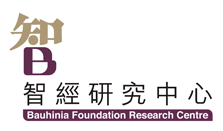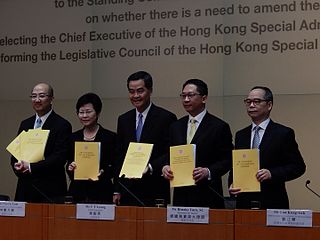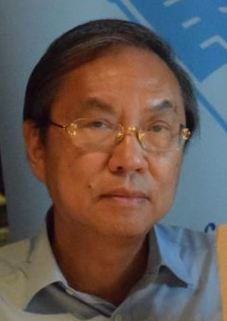
The chief executive of the Hong Kong Special Administrative Region is the representative of the Hong Kong Special Administrative Region and head of the Government of Hong Kong. The position was created to replace the office of governor of Hong Kong, the representative of the monarch of the United Kingdom during British rule. The office, stipulated by the Hong Kong Basic Law, formally came into being on 1 July 1997 with the handover of Hong Kong from the United Kingdom to the People's Republic of China.

Elections in Hong Kong take place when certain political offices in the government need to be filled. Hong Kong has a multi-party system, with numerous parties in the Legislative Council. The Chief Executive of Hong Kong is nonpartisan but has to work with several parties to form a coalition government.

The Election Committee is a Hong Kong electoral college, the function of which is to select the Chief Executive (CE) and, since 2021, to elect 40 of the 90 members of the Legislative Council. Established by Annex I of the Basic Law of Hong Kong which states that "the Chief Executive shall be elected by a broadly representative Election Committee in accordance with this Law and appointed by the Central People's Government ." It is formed and performs its selection function once every five years, even in the event of a CE not completing their term. The membership of the Election Committee was expanded to 1,500 under the massive overhaul of the electoral system in 2021. The Election Committee has been criticised for its "small-circle" electoral basis and its composition favouring pro-Beijing and business interests.

The 2005 Hong Kong Chief Executive election was held to fill the vacancy of the territory's top office. Then Chief Executive Tung Chee-hwa submitted his resignation to the central government in Beijing, and was officially approved on 12 March. As Donald Tsang, Chief Secretary for Administration in Tung's cabinet, was the only candidate, he was declared elected unopposed on 16 June. Tsang took office on 21 June to begin his first two-year term.

Charles Peter Mok, JP is a Hong Kong-based Internet entrepreneur and IT advocate who formerly represents the Information Technology functional constituency on the Hong Kong Legislative Council.

Ir Albert Lai is the Climate Strategy Leader of Deloitte China and the former CEO of Carbon Care Asia, a mission-driven business in carbon strategy and sustainability innovation. He is the founding chairman of The Professional Commons, an independent public policy think-tank and the Hong Kong People’s Council for Sustainable Development, as well as founding Vice-Chairman of the Civic Party. He also served as a member of the Commission on Strategic Development, and a member of the Strategy Sub-Committee, Council for Sustainable Development, Hong Kong SAR Government.

Anthony Cheung Bing-leung, GBS, JP is a Hong Kong politician and academic. He was the Secretary for Transport and Housing from 2012 to 2017 and 5th President of the Hong Kong Institute of Education (HKIEd). He was one of the few government officials coming from a pro-democracy background.

The Co-operative Resources Centre was a short-lived political group in the Legislative Council of Hong Kong (LegCo). Led by the Senior Unofficial Member of the Executive and Legislative Councils Allen Lee, it was established on 12 December 1991 by a group of 21 appointed and indirectly elected Legislative Council members from the functional constituencies. It became the largest conservative faction in the legislature countering the pro-democracy United Democrats of Hong Kong (UDHK) won a landslide victory in the first direct Legislative Council election in 1991. In 1993, it was transformed into the Liberal Party.

The Bauhinia Foundation Research Centre was a privately funded public policy think tank in Hong Kong. The organisation stated that its aim was "to promote the understanding of the 'one country, two systems' arrangements in Hong Kong and other socioeconomic policies in Hong Kong, for public benefit."

Dennis Kwok Wing-hang is a former member of the Hong Kong Legislative Council from 2012 to 2020 and founding member of Civic Party.

The 2014–2015 Hong Kong electoral reform was a proposed reform for the 2017 Hong Kong Chief Executive election and 2016 Legislative Council election.

Youngspiration is a localist political party in Hong Kong founded in 2015. It emerged after the 2014 Hong Kong protests with an agenda of protection of Hong Kong people's interests and culture against the interference of the Chinese government and advocated the "Hong Kong nation's right to self-determination". The group wants a self-determination referendum in 2020 with the results effective in 2047, when China's "one country, two systems" promise ends. As of 2016, the convenor of the group is Baggio Leung.
Conservatism has deep roots in Hong Kong politics and society. Today, as a political trend, it is often reflected in but not limited to the current pro-Beijing camp, one of the two major political forces in Hong Kong, as opposed to liberalism, a dominant feature of the pro-democracy camp. It has also become a political view taken by some localist political parties.

Path of Democracy is a political group and think tank established in 2015 in Hong Kong. It is led by former Civic Party legislator Ronny Tong, who joined the Executive Council on 1 July 2017. Although officially unaligned with either the pro-Beijing camp or the pro-democracy camp, the group has been supportive of the policies and legislation put forward by the former, and was considered by the media to be pro-Beijing by 2021.

Joseph Cheng Yu-shek, JP is a Hong Kong political scientist and democracy activist. He was the secretary general of the Civic Party and convenor of pro-democratic groups including Power for Democracy and Alliance for True Democracy.
The election for the Hong Kong deputies to the 13th National People's Congress (NPC) was held on 19 December 2017. 36 Hong Kong deputies were elected by an electoral college composed of 1,989 members.
The Professionals Guild was a pro-democracy parliamentary group in the Legislative Council of Hong Kong. All legislators in the group were elected through professional sectors in the Functional Constituencies. The group was active between the 2016 Legislative Council election and the mass-resignation of pro-democracy legislators in 2020.

The 2021 Hong Kong electoral changes were initiated by the National People's Congress (NPC) on 11 March 2021 to "amend electoral rules and improve the electoral system" of the Hong Kong Special Administrative Region (HKSAR) for its Chief Executive (CE) and the Legislative Council (LegCo), in order to ensure a system in which only "patriots", according to the Chinese definition, govern Hong Kong. The reforms have been widely criticized for their negative impact on the democratic representation in the Hong Kong legislature.

The Seventh Legislative Council of Hong Kong is the current meeting of the legislative branch of the Hong Kong Special Administrative Region Government. It is scheduled to meet in the Legislative Council Complex, from 1 January 2022 to 31 December 2025, overlapping the six months of Carrie Lam as the fifth term of the Chief Executive and the sixth term of Chief Executive. The membership of the Legislative Council will be determined in the December 2021 election.
The election for the Hong Kong deputies to the 14th National People's Congress (NPC) was held on 15 December 2022. 36 Hong Kong deputies were elected by an electoral college composed of 1,420 members.














